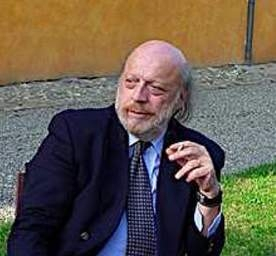A Brief History of the Quantum Paradigms in Psychopathology
In the past few years, quantum-psychological and quantum-neurodynamical ideas have provided alternative hypotheses concerning the genesis and nature of mental illness. Starting in 2012, every year an interdisciplinary group of scientists has been meeting in various locations in Italy to provide presentations on recent advances in this field and engage in vigorous scientific debates

The issue of the molecular nature of brain activities has been of great interest to not only neurophysiologists but also information scientists and psychopathologists.
While much is known about the architecture of brain cells and their individual activities in terms of the action potential, ion channels and ionic currents, much less is known about such issues as where are memories stored, which molecular mechanisms are involved in information processing and cognitive functions.
Speculations about molecular mechanisms of cognition range from mundane (mechanistic) to exotic (quantum field theoretic).
In particular, much has been hypothesized about the possibility of some cognitive functions requiring the operation at a level of quantum physics.
The way for this has been paved by the work of physicists like Hiroomi Umezawa, Kunio Yasue, Giuseppe Vitiello, and Travis Craddock, mathematicians like Roger Penrose, and biomedical investigators like Stuart Hameroff, Massimo Cocchi, Roman Poznanski and Gustav Bernroider.
These innovators have laid a foundation for a possible rapprochement between material substrates and human cognition.
In the past few years, quantum-psychological and quantum-neurodynamical ideas have also provided alternative hypotheses concerning the genesis and nature of mental illness.
Starting in 2012, every year an interdisciplinary group of scientists has been meeting in various locations in Italy to provide presentations on recent advances in this field and engage in vigorous scientific debates.
Below is a list of these conferences in reverse chronological order and their locations:
- Eleventh Qpp (Quantum Paradigms of Psychopathology) Meeting is scheduled to take place in April, 2022 and will be held in a hybrid format in Turin.
- Tenth Quantum Paradigms of Psychopathology (Qpp) Meeting (part of the 93th National Congress of Italian Society of Experimental Biology – Sibs), Palermo and online April 2021.
- Nineth Qpp Conference 2020 (online): “Dialogue Between Classic and Quantum Brain. A Roadmap in Psycho-Neurophysiology from Cytoskeleton and Ion Channels to Cellular Membranes”, November, 2020.
- Eighth Qpp Conference: “Brain and Gut Neuroscience: From Molecules to Mood”, September 2019, Turin, Italy
- Seventh QPP Summer School on Neuroscience: “From Molecules to Moods”, Turin, Italy, August 2018.
- Sixth Qpp Conference held jointly with the Italian Society of Experimental Biology annual meeting, Trapani, Italy, October 2017.
- Fifth Conference on Quantum Paradigms in Psychopathology, Como, Italy, October, 2016
- Fourth Quantum Paradigm Psychopathology Conference, Como, Italy, May 2015.
- Third Quantum Psychopathology Conference, Bologna, Italy, June 2014.
- Second International Symposium on Quantum Psychopathology, Palermo, Italy, April 2013.
- 11. First Qpp Conference: “A Long Shadow over the Soul: Molecular and Quantum Approaches to Psychopathology an Interdisciplinary Dialog with Psychiatrists”, Fano, Italy, March 2012.
These meetings were sponsored by Bromatech, Politecnico di Torino and Società Italiana di Biologia Sperimentale (Sibs).
The Organizing Committee consisted initially of Massimo Cocchi and Lucio Tonello who were later assisted by Jack Tuszynski, Marco A. Deriu, Marco Pettini and Marco Cavaglià.
The founding members of Qpp were Donald Mender (Yale Univ.) and Massimo Cocchi (University of Bologna).
In 2017, Jack Tuszynski took over from Massimo Cocchi as the President of Qpp.
The main group of speakers participating in these meetings were: Massimo Cocchi, Gustav Bernroider, Lucio Tonello, Fabio Gabrielli, Jack Tuszynski, Donald Mender, Natale Giuseppe Frega, Giovanni Lercker, Massimo Pregnolato, Giuseppe Vitiello, Marco A. Deriu, Marco Pettini, Ted Dinan, Paavo Pylkkanen, Francesco Cappello, Travis Craddock, Ursula Werneke, Alessandro Vercelli, Mark Rasenick, Mansoor Malik, Gordon Globus, Giovanna Traina, Johannes Sumhammer, Stuart Hameroff, Marco Pettini.
This resulted in major efforts to bridge the gap between quantum physics and neuroscience, which were undertaken by members of the Qpp initiative led by Massimo Cocchi in order to develop viable quantum paradigms of psychopathology.
Nancy Woolf and her collaborators suggested possible links between psychopathology and anomalous quantum computation in cytoskeletal proteins.
Paavo Pylkkanen hypothesized a relationship between diffuse physical substrates of mental illness and quantum “pilot waves” gone awry.
Massimo Cocchi and his collaborators identified via membrane biophysics possible quantitative correlations between phospholipid composition, serotonin and quantum properties of the cytoskeleton in depression and psychosis.
Paola Zizzi and Massimo Pregnolato suggested wave-like quantum logic as a possible non-Boolean algebra underlying primary process in thought disorders.
Eliano Pessa and collaborators proposed a mathematical structure for psychiatric disease nosology based on symmetry breaking.
These ideas may guide future explorations of quantum paradigms of psychopathology.
First, shifts from coherent to incoherent quantum brain states may, when aberrant, flag neural correlates of psychotic perception. Second, persistently mismatched phase relations among “parallel channels” of quantum information processing may shed light on clinical thought disorders.
Third, bulk properties of brain states emerging from scaled-up quantum-statistical aspects of neural matter may include subjective experience, including normal and abnormal variation of moods.
This may inform us about effects of psychotherapeutic interventions, including electromagnetic brain stimulation.
An important emerging topic is that of the gut-brain axis via microbiota.
Proceedings of the 2018 and 2019 meetings were published by the Journal of Integrative Neuroscience with an editorial paper summarizing this work:
- Cocchi, M. Deriu and J.A. Tuszynski, Editorial: Quantum Paradigms in Psychopathology: Multiscale Investigations from Biomolecular Qubits to the Brain and its Pathological States, Journal of Integrative Neuroscience (accepted July 11, 2021).
This collection of papers was dedicated to the memory of Dr. Kary Mullis (Nobel Prize, 1993) who was an active participant in Qpp Meetings, a friend, mentor and colleague to all of us.
In honor of Kary Mullis, Qpp established the Kary Mullis Prize for achievements in the life sciences.
The inaugural recipient of the Kary Mullis Prize was Prof. Rudy Tanzi of Harvard Medical School. The second recipient of the Kary Mullis Prize will be Prof. Michael Levin of Tufts University.
In 2021, the Qpp conference featured two Nobel Prize winning speakers:
Prof. Michael Houghton, University of Alberta (Nobel Prize for Medicine and Physiology, 2020) and Prof. Roger Penrose, University of Oxford (Nobel Prize for Physics, 2020).
Photo Olio Officina©, unknown subject
To comment you have to register
If you're already registered you can click here to access your account
or click here to create a new account


Comment this news